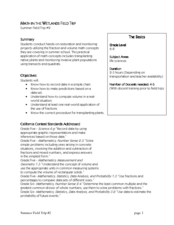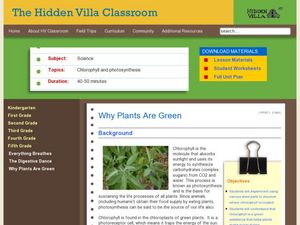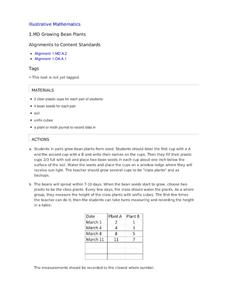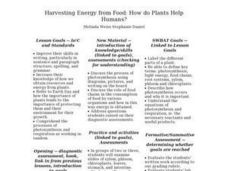Curated OER
Study of Plants
This plants PowerPoint identifies and lists the main functions of the basic parts of a plant. Each slide displays 2-4 bullet points using concise language for efficient learning. After each plant part is described, the students play a...
Alabama Wildlife Federation
Colors to Dye for!
Nature provides a rainbow of colors at one's fingertips. A hands-on activity uses natural plant materials to create all-natural dyes. Plants range from fruits and vegetables to flowers and greens. After extracting the pigments, eager...
Curated OER
How Are Plants Similar And Different?
Studetns create an index card database of different categories of plants such as bushes, trees, flowers, grasses and vegetables. They review the different parts of a plant and label pictures of plants on the database cards. They use the...
Curated OER
Plants Of Texas
Fourth graders investigate the types of plants that are found in Texas. They conduct research using a variety of resources and answer some critical thinking questions. Then students use the information to set the context for role-playing...
Curated OER
Vocabulary Study: Chapter 3A Science: Plants
As a quick review of plants this presentation would be perfect. Plant concepts such as photosynthesis, pistil, pollination, roots, and stamen are covered. There are colorful graphics that make it inviting and easy to understand.
Captain Planet Foundation
Rotting Away
What happens at the end of a plant's life cycle? Show kids the natural way that plants show that they're decomposing, as well as the importance of compost, with a lesson about living organisms. After reading Log Cabin by Anne Schreiber,...
Curated OER
Flower Power
Determine which plants are flowering plants with a helpful lab sheet. Kids first observe illustrations of different plants, such as a carnation and a fern, then decide which plants produce flowers, spores, or cones. Use magazine pictures...
Curated OER
Build a Coral Polyp
Learners build a coral polyp out of a banana, straw, oyster crackers, sprinkles, and more. In this coral polyp lesson plan, students also list the differences between plants and animals.
Curated OER
Plant Power
Here is an opportunity for your first graders to take a close look at plants: what they need to survive, how they grow, and the names of each plant part. The book, Corduroy's Garden is used to open the lesson. Then, youngsters utilize...
Curated OER
Aquatic Roots
Young scientist use reference materials to research various local aquatic plants and or animals to find out whether they are natives or exotics. They investigate their impacts on people, other animals and the environment. Learners...
Curated OER
Math in the Wetlands Field Trip
Get your class out in the environment for hands on math activities. In this wetlands lesson, learners transplant native plants, calculate how much soil is needed, and perform math activities based on this experience. They then make...
Curated OER
Plant Diversity
Here is an all-encompassing overview of the plant kingdom! In this learning exercise, beginning botanists describe characteristics of the four different plant phyla, explain various life cycles, differentiate between monocots and dicots,...
Curated OER
Introduction to Watsonville Wetlands
Identify the different plants and animals found in wetlands, your class will explain the importance of wetland ecosystem and locate the different wetlands in their area.
Curated OER
Land Plants and Algae
Young scholars compare and contrast algae and land plants. In this plant lesson students discover what algae and land plants require for growth. The young scholars discuss experimental design. The students experiment with different...
Curated OER
fun with Plants that We Use
Students become familiar with the products made from various plants. In this plants lesson plan, students experiment with natural dyes from plants. Students complete a list of things made from plants. Students answer...
Curated OER
Why Plants Are Green
Young scholars discover the properties of chlorophyll in plants. In this plant biology lesson, students conduct an experiment to find where the chlorophyll in the plant is located. Young scholars are split into small groups and study...
Curated OER
Plants vs. Animals
Students discuss the differences they can see between examples of animals and plants. For this science lesson, students draw or write what they have discussed about the examples. Students go on a nature walk to look...
Curated OER
Plant Life Cycle Activities and Lesson Plans
Curb spring fever by bringing some of the great outdoors into your classroom with plant life cycle activities.
Curated OER
Discovering Plants With Lewis and Clark
Students research plants and examine populations in ecosystems.
Illustrative Mathematics
Growing Bean Plants
Plant growth experiments offer rich, cross-curricular learning opportunities that can really excite and engage young learners. In this series, children work in pairs planting, measuring, and comparing the height of bean plants in order...
ARKive
Plants
Here is a one-hour activity that helps learners remember the parts of plants. Not only will the class learn about plant parts, they'll also discuss seed dispersal and plant growth. A celery experiment is used to show how plants obtain...
Curated OER
Harvesting Energy from Food: How do Plants Help Humans?
Beginning botanists view slides of plant vascular tissue. They watch Magic School Bus Gets Planted, which you can find online, and then write a summary of what they have learned about plants. This instructional activity could be used...
Curated OER
Changing Planet: Withering Plants - Stressing Over Lost Water
Expectant earth scientists examine the bottom side of a leaf and learn the role of the stomata. They consider the gas exchange that occurs through these structures and relate how the climate is changing to its impact on food crops. This...
Curated OER
Mystery Marauders
Learners investigate plants with pest damage. In this plant life lesson, students study plants that have been damaged by insects. Learners try to discover which insects are causing the damage.
Other popular searches
- Life Cycle of a Plant
- Plant Animal Life Cycles
- Life Cycle of Plant
- "Life Cycle" Plant
- Plant, Animal Life Cycles
- Life Cycle Plant
- Life Cycle Bean Plant
- Life Cycle Flowering Plant
- Life Cycle of a Bean Plant
- Science Life Cycle of a Plant
- Life Cycles of a Plant
- Plant Lifecycles

























